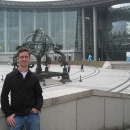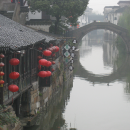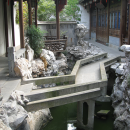There is Heaven Above, and Hangzhou and Suzhou Below Past Review
By Robert G (Asian Studies/Civilization., Austin College) for
Zhejiang University of Technology: Hangzhou - Direct Enrollment & Exchange
The study abroad experience was invaluable, and I'm extremely happy that I went for a full-year instead of a single semester. After my time abroad, I feel that I am more able to understand the Chinese perspective, including the Chinese idea of "face" and "losing face". I also learned how to be assertive in a country of over 1-billion people and get things done, even when others say they are impossible.
Review Photos





Personal Information
| If you took classes at multiple universities, list those universities here: | Zhejiang University |
| How much international exposure did you have prior to this program? | 1 month - 6 months |
Review Your Program
|
* Overall educational experience
Academic rigor, intensity, resources, etc. |
The grading system was not always clear while in China, but the teaching styles seemed to be just as effective. Many of the classes were less focused on homework and essays, instead looking for participation within the classroom. The classes taught exclusively for Central College Abroad students were small-sized. This was because we had no more than 10 total students each semester I studied, and not everybody took the same courses. Despite the language courses provided by Zhejiang University having a greater number of students, the teachers were careful to call on every student during almost every session. |
|
* Host Country Program Administration
On-site administration of your program |
Overall, the program was well-run. Sometimes I felt that responsibilities were unloaded onto the assistant (who was a Chinese student at Zhejiang University), but most of the American student needs were addressed. Further, we were provided with a separate space that other international students at Zhejiang University envied; some even told me that they wished their program did something similar. This space provided unlimited electricity, internet access, and a kitchen. On-campus dorms were limited to 60 kilowatts per month (although more can be purchased), and internet required a fee, so the Central College Abroad Office would often have students cooking, playings games, and working on homework. I should also mention that classes exclusive to Central College were taught there as well. The program director in Hangzhou, China is a Chinese woman, and has lived in Hangzhou for multiple years already. She spoke fluent English, and had a good sense of humor when she made mistakes in speaking. She was always on-call to help translate or explain. The only complaint was that students often had to stay on-top of their residence permits or visas themselves. Between semesters, I had to rush around trying to extend my resident permit and wish she had reminded us when that date was getting nearer. |
|
* Housing:
How satisfied were you with your living arrangements? |
For the first semester that I spent with Central College Abroad, I stayed in the international dorms of Zhejiang University. My dorm was on the 5th floor of the international building, which also housed the International Student Cafeteria. The dorm room itself was small, but had its own bathroom. It was nice not to have to share space while in a different country and culture. Adjacent to the international building was building 31, where most of the classrooms were located. Additionally, almost directly across the street was a small grocery store. The location of the campus housing was very convenient. For night-life, the Yu Quan campus was within 10-minutes walking distance of the Yellow Dragon Sports Complex, which is surrounded by bars, restaurants, and shopping. Unless I wanted to, I never had to go far from home. The only problem with the housing was the concentration of international students. I found that by clustering us all together, it really took away from our opportunities to practice language (unless, again, we sought to get away from that crowd). The second semester, I moved off-campus to a rented apartment. The apartment was just as close to building 31 as the international dorms, and I enjoyed having a larger space. The landlady was aggressive, and I would not recommend renting from that particular one, but I met many international students who had more decent landlords. |
| * Food: |
In China, it was easy to find food to accommodate any budget. For less than 7 RMB (roughly equivalent to one US dollar), it's not hard to stuff oneself silly with breakfast. Most restaurants would serve food in the traditional Chinese "family-style", so it was better to eat with a friend or two. 30 RMB could buy a full meal for 2 or 3, including drinks, at the International Student Cafeteria. Western-style food was not difficult to find either, but would sometimes require a brief walk to get to. |
|
* Social & Cultural Integration:
How integrated did you feel with the local culture? |
The various excursions provided by Central College Abroad were very worthwhile. From scenic locations within Hangzhou city, to week-long tours of Beijing and Shanghai, I felt that they really exposed areas of significant historical or cultural interest. The longer trips also helped to build friendships between some of the students. Many Central College Abroad students came from Central College itself, but I never felt like an outsider because I came from a different school. My favorite area inside Hangzhou itself was a location called "Nine Streams", which I would not have found without our class visit. We walked about 3km along the edges of tea-farms (that were on the slopes of nearby mountains). After we arrived at the village, we drank the local tea and had lunch prepared for us by some of the local people there. Those people were extraordinarily rich, but very hospitable and friendly. When my parents came to China for a visit, I took them there as well. |
|
* Health Care:
How well were health issues addressed during the program? |
|
| * Safety: |
Once on the program site in Hangzhou, China, there is no feeling of insecurity. The streets on and around campus were safe at all hours. On one notable evening, I walked to the nearest McDonald's and back, 15 minutes each way. This was at 4am. I was never peeking around dark corners, or startled by unexpected sounds. Similarly, I met a few students from other countries that would walk back from bars at 2am. As far as health issue, I think they were addressed more strongly than in the United States. If a student had a cough, a fever, or any other seemingly minor symptom, the Central College program director took them to the hospital. During an excursion to Beijing, the program director slept overnight at the hospital with a student so that she could translate and ensure he was getting adequate treatment. |
| If you could do it all over again would you choose the same program? |
Yes
|
Finances
|
* Money: How easily were you able to live on a student's budget?
(1 = not very easy/$200+ on food & personal expenses/week, 2.5 = $100/week, 5 = very easily/minimal cost) |
|
Language
| * Did your program have a foreign language component? | Yes |
| If applicable, to what degree did your living situation aid your language acquisition? |
|
| Language acquisition improvement? |
As part of the Central College Abroad program, Intensive Chinese language was taught. Students going with CCA attent language classes at Zhejiang University with other students from around the world. Beginning level classes are taught in English, and every level beyond that is taught in Mandarin Chinese. (I pr hadior experience and did not take those beginning classes). Some of the teachers there spoke foreign languages such as English and French, but nearly all in-class discussions were in Mandarin Chinese. Forcing us to use Mandarin to learn Mandarin was difficult but rewarding and I felt that it helped improve my language skills much faster than simply being taught in English might have. The language instruction was split into four-classes: Intensive Reading, Extensive Reading, Listening, and Speaking. Intensive Reading focused on Grammar and individual word-meaning, while Extensive Reading focused on comprehension of passages, even when specific words were unknown to us. |
Other Program Information
|
* Where did you live?
Select all that apply |
|
|
* Who did you live with?
Select all that apply |
|
A Look Back
| * What do you know now that you wish you knew before going on this program? | The type of student that would benefit most from this program is the adventurous type. I don't mean to say adventurous in the sense of outdoorsy people, but instead people who are willing to take themselves out of their comfort zone. It is very easy to stay inside the gates of Zhejiang University, and only spend time with other Western students. What took more effort was to spend time getting to know Chinese students, and visiting places outside of the immediate area around campus. It is, however, very worth the effort. |
Individual Course Reviews
| Course Name/Rating: |
Modern Chinese Literature in Translation |
| Course Department: | Unknown |
| Instructor: | Huiming Ren |
| Instruction Language: | English |
| Comments: | This course was particularly interesting because it was taught by a professor who studied in America for 8 or 9 years. He would occasionally apologize about his poor English, but that baffled us; his English was fluent and he rarely did not know an appropriate word for his lectures. The assigned reading was insightful into the Chinese culture and in cases where the translation lost significant meaning, the professor would explain the original Chinese context. One of my classmates had no prior Mandarin exposure, and I felt that this class and its content were still accessible to her. |
| Credit Transfer Issues: | My home institution, Austin College, treats study abroad courses as if they were taught on-campus. The only difference is that courses toward a major or minor must be specifically added with a Major Modification Form or a Minor Modification Form. Additionally, this course was offered at 3 credit hours which converts to 0.75 Austin College credits and does not fully fill a space that a course taught on-campus would. |








